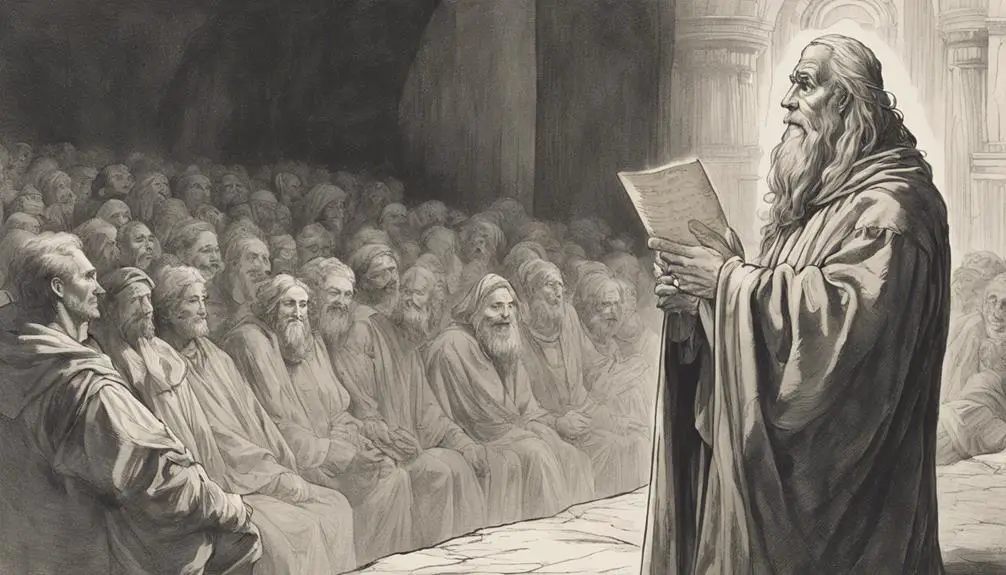Yearning for a deeper understanding of biblical contradictions? Explore the contentious topic of perceived divine deception in our thoughtful analysis.

Examples of God Lying in the Bible
You might not be aware that the Bible, widely revered as the infallible word of God, contains instances that some interpret as God not being entirely truthful. Consider the Garden of Eden, where the serpent's claim about the fruit seems more accurate in hindsight, or God's promise to Abraham, which takes an unexpected turn.
What about Job's suffering or Jacob's divine deception? These might seem like hard-to-swallow contradictions. However, with careful analysis and thoughtful discussion, we can explore these events in a new light, challenging our preconceived notions about truth and divine morality.
Key Takeaways
- The Garden of Eden incident illustrates apparent deception by God through delayed consequences of forbidden fruit consumption.
- Jacob's identity switch for Isaac's blessing, silently endorsed by God, can be perceived as divine deception.
- Gibeonite deception involving a peace treaty with Israelites suggests divine intervention through a deceitful act.
- Biblical narratives like God's Promise to Abraham and Job's suffering reveal possible inconsistencies, raising questions about divine honesty.
The Garden of Eden Incident

Diving into the Garden of Eden incident, you confront a controversial interpretation where God is perceived to have used deception. This interpretation hinges on the Serpent's Deception and Eve's Temptation.
Firstly, consider God's warning to Adam and Eve about the forbidden fruit. It's suggested that God lied about the consequences, predicting death upon consumption. However, after Eve's Temptation by the serpent, they didn't die instantly as forewarned, leading to claims of God's deceit.
Scholars have contended that God's warning referred to spiritual death, not physical. Yet, this interpretation still fuels the perception of deceit, as it's argued that God deliberately misled Adam and Eve by not being explicit.
Secondly, the Serpent's Deception is critical. The serpent, viewed as an adversary of God, contradicted God's warning. It promised Eve not death, but wisdom and enlightenment. As Eve didn't die instantly after eating the fruit, the serpent's words seemed truthful.
The ambiguity of God's warning, coupled with the serpent's seemingly accurate prediction, portrays a scenario where God appears deceptive. However, this interpretation is controversial and subjective, as it largely depends on one's reading and understanding of the scripture.
God's Promise to Abraham

Shifting our focus from the Garden of Eden to Abraham's narrative, you'll find another instance where God's truthfulness is put under scrutiny – His covenant with Abraham. This Abrahamic Covenant, as it's commonly known, has been a subject of theological debate for centuries.
You'll recall that God promised Abraham descendants as numerous as the stars and land for them to inhabit. However, the fulfillment of this promise seemed to hang in the balance when God later commanded Abraham to sacrifice his son Isaac. This directive is often seen as a contradiction to the initial promise, as Isaac's death would have rendered the promise of numerous descendants impossible.
Yet, there's more to this narrative. God didn't allow Abraham to go through with the Sacrifice of Isaac. Some argue that this was a test of Abraham's faith, not an actual intent to contravene His earlier promise. However, it's worth noting that the command itself, regardless of the outcome, raises questions about God's consistency.
This analysis doesn't intend to conclude whether God lied or not. Instead, it highlights the complexity within these biblical narratives that warrant rigorous scrutiny.
The Case of Job's Suffering

Turning our attention to the story of Job, you'll encounter a perplexing scenario where God, seemingly without cause, allows a righteous man to undergo immense suffering. This bewildering narrative raises questions about Job's integrity and the concept of divine testing.
To analyze this, let's break it down in four parts:
- Job's Integrity: Despite his suffering, Job maintains his righteousness. Unlike other biblical figures who falter under trial, Job's faith remains unshaken. This challenges the idea of righteous suffering as divine punishment.
- Divine Testing: God allows Satan to torment Job, yet he prohibits taking Job's life. This is a test, not only for Job, but also for God's righteousness.
- God's Silence: Job's pleas for an explanation are met with silence. This raises questions about divine communication and human understanding of God's will.
- The Conclusion: Job's reward at the end – restored health, wealth, and family – doesn't erase his suffering. The question remains: was this divine justice or a divine test?
In this light, the story of Job isn't an example of God lying, but rather, it's a complex exploration of suffering, righteousness, and divine testing.
Jacob's Divine Deception

Let's now explore the intriguing account of Jacob's divine deception, a biblical narrative that presents a unique scenario where God, through a dream, seemingly endorses dishonesty. This story revolves around Jacob's identity switch, where he masquerades as his brother Esau to receive Isaac's blessing. The divine deception consequences here are manifold and complex.
Consider this table, detailing key aspects of this narrative:
Aspect |
Jacob's Deception |
Result |
|---|---|---|
Act |
Jacob's Identity Switch |
Blessing Received |
Divine Intervention |
God's Silent Endorsement |
Divine Deception Consequences |
Outcome |
Jacob becomes Israel |
Esau's Wrath |
Jacob's identity switch, aided by his mother Rebekah, results in him receiving the blessing meant for his older brother, Esau. Despite the deceit, God does not reprimand Jacob. Instead, the divine consequences of this deception are that Jacob becomes the father of the Twelve Tribes of Israel. However, this act of dishonesty also incites Esau's wrath, leading to years of conflict between the brothers.
This narrative raises challenging questions about deceit in the pursuit of divine promise, making Jacob's divine deception a controversial and thought-provoking tale.
The Gibeonite Deception

Drawing parallels with Jacob's narrative, you might find the story of the Gibeonite deception equally intriguing, where cunning and deceit are used in an attempt to secure divine favor. The Gibeonite survival hinged on a deceptive diplomacy, a clever strategy of self-preservation that has its roots in the Old Testament narrative.
- The Gibeonites, fearing annihilation from Israel, craft a ruse: They pretend to be ambassadors from a distant land.
- They present worn-out sacks and wineskins, along with stale bread, to substantiate their false claim.
- Joshua and the Israelites, deceived by their appearance and their words, make a peace treaty without consulting God.
- The deception is unmasked three days later, but the treaty stands due to the sacredness of an oath in Israelite culture.
This story showcases a moment of divine silence, where God doesn't prevent the deception. It's not because He approves of lies, but rather it serves as a reminder of the importance of seeking divine guidance. The Gibeonite deception becomes a lesson in humility for the Israelites, a testament to the intricate dance of freedom, deceit, and divine sovereignty.
Micaiah's Lying Spirit

Delving into the narrative of Micaiah's lying spirit, you encounter another complex instance of deception in the Bible, where divine orchestration intersects with human free will and prophecy. Found in 1 Kings 22, this story presents a case of prophetic manipulation that challenges traditional understandings of divine truthfulness.
Micaiah, a prophet, reveals a vision where God allows a lying spirit to influence King Ahab's prophets, leading to Ahab's death. This divine falsehood, allowing misinformation to spread, raises complex questions about the intersection of divine will and human action. God didn't directly lie; instead, He allowed a spirit to disseminate falsehood, pushing the boundaries of understanding divine truth and deception.
Analyzing Micaiah's vision, you can't overlook the strategic manipulation of prophecy. The lying spirit is portrayed as a tool in God's hands, used to fulfill His divine plan. This scenario challenges the traditional monotheistic view of a God who can't lie, by introducing a God who, in His sovereignty, permits deception for His purpose.
Frequently Asked Questions
What Are Some Other Biblical Instances Where God Is Perceived as Lying?
You're delving into complex territory, exploring interpretations of Divine Honesty and Biblical misconceptions.
It's key to remember that perspectives on God's truthfulness vary greatly. Some might point to instances like God's conversation with Adam and Eve in Genesis, or His dialogue with Abraham about Sodom. But these are open to interpretation and debate, not clear-cut examples of deceit.
Differing perceptions are inevitable when analysing ancient, sacred texts.
How Do These Examples Influence Our Understanding of God's Character?
These examples force you to grapple with the Divine Deception Paradox, challenging traditional notions about God's morality.
You're faced with the task of reconciling perceived inconsistencies in God's character.
It's a complex debate, one that demands a deep dive into theological discourses and biblical interpretation.
How Do Theologians and Religious Scholars Interpret These Instances?
As a theologian or religious scholar, you'd likely engage in Divine Truth Interpretation and Biblical Paradox Exploration. You wouldn't view these instances as God lying, but as complex narratives to understand God's nature.
You'd consider cultural, historical, and linguistic contexts to discern the intended lessons. It's more about understanding the divine complexities rather than labeling actions as deceitful. This enhances your knowledge of biblical texts and their profound insights.
Are There Any Similar Instances in Other Religious Texts Where Deities Are Depicted as Lying?
You'll find similar instances of deceptive deities in other religious texts too. It's important to remember that these are often complex narratives, requiring careful analysis.
While truthfulness in religion is a valued principle, these stories often serve to illustrate broader moral or philosophical points. They're not necessarily literal, but rather may challenge us to reflect on the nature of truth, honesty, and the complexities of divine will.
What Impact Do These Examples Have on the Faith and Beliefs of Religious Followers?
Questioning divine morality and exploring biblical paradoxes can challenge your faith. It's natural to grapple with difficult passages, and it doesn't necessarily weaken your beliefs. Instead, it can deepen your understanding and appreciation of your faith's complexity.
Conclusion
In dissecting these biblical narratives, we find instances that seem to suggest divine deception. From Eden to Abraham's promise, Job's suffering, Jacob's trickery, the Gibeonite ruse, and Micaiah's lying spirit, we see God's complex involvement in truth and falsehood.
However, these instances aren't simple lies but part of a larger theological discourse, challenging our understanding of truth, divine will, and God's ways, which according to the Bible, are higher than ours.



Sign up